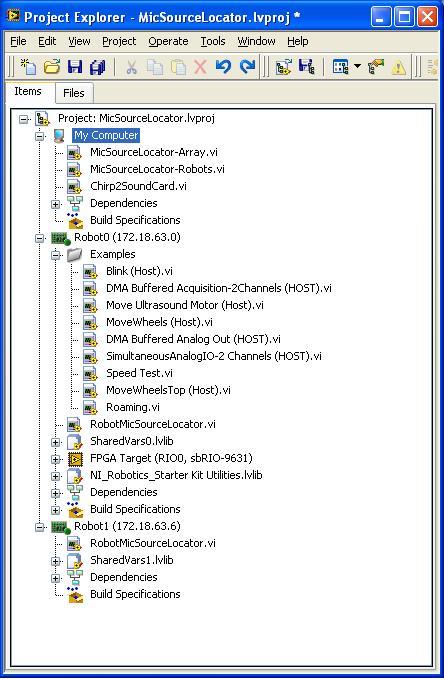Project2: Triangulation with sbRIO robots
From ESE497 Wiki
Jump to navigationJump to search- Download RoboticSensing.zip and extract to your Home Directory if you haven't already. Run RoboticSensing\MicSourceLocator.lvproj.
- Description of RoboticSensing.lvproj
- Make sure you run your code from a mapped network drive
- Run Sample Code:
- Get 1 sbRIO robots and place it near the blackboard for good wireless reception. Turn on the Master power switch and the Motor switch. Wait 10 seconds and right click on Robot0 and select Properties and enter the IP labeled on the robot.
- Open My Computer -> SingleRobotControl.vi. Run this VI.
- Open Robot0 -> RobotMicSourceLocator.vi. Run this VI.
- Once both VIs are running, you should see the MicSourcLocator-Robots -> MotorMoving indicator turn off and the b value of SingleRobotControl.vi -> PairSolutions count up. The signals for both microphones will be displayed on the graph of RobotMicSourceLocator.vi
- Click on MicSourceLocator-Robots.vi -> MoveRobots and the motors should turn 1 revolution.
Project 2
- Part A: Compute Angle on a Single Robot
- Modify RobotMicSourceLocator to Compute the angle of arrival on the Robot platform using your FindCCPeak.vi and ComputeAngle.vi. It should transmit the angle to MicSourceLocaotr-Robots running on the PC using the Shared Variables.
- If you get error -52003, there is probably an un-handled exception. If you are using Cross-Correlation then the problem is you are running out of memory.
- Part B: Move the Robot
- Modify MoveRobot vi to move the robot to the position indicated by the SharedVariable sent from SingleRobotControl->RobotLoc. You will have to push the MoveRobots control to get it to send the new X,Y and Rotation to the robot.
- Part C: Source Location using 2 Robots
- Use My Computer -> MicSourceLocator-Robots.vi to communicate with 2 robots.
- Change NUM_ROBOTS variable by right-clicking on Project -> Properties -> Conditional Disable Symbols and set NUM_ROBOTS = 2
- Modify MicSourceLocator-Robots.vi to compute the source location and plot the web using the angles computed on the robots
- Our derivation assumes that the accoustic source is in the +y half plane of both microphone pairs so only put the sources in that region.
- Make sure it works for Rotation = 45 on the right microphone pair and Rotation = -45 for the left microphone pair.
- Test on the 2 robot microphone array
- Test out your triangulation with the robots in different position and rotations as commanded by MicSourceLocator-Robots.
- Part D: Track Audio Source Automatically
- Modify MicSourceLocator (PC with Robots).vi to autmoatically move the robots towards the estimate source position. The goal is to position them 0.4m from the source rotated +/- 45 degrees from the x-axis.
